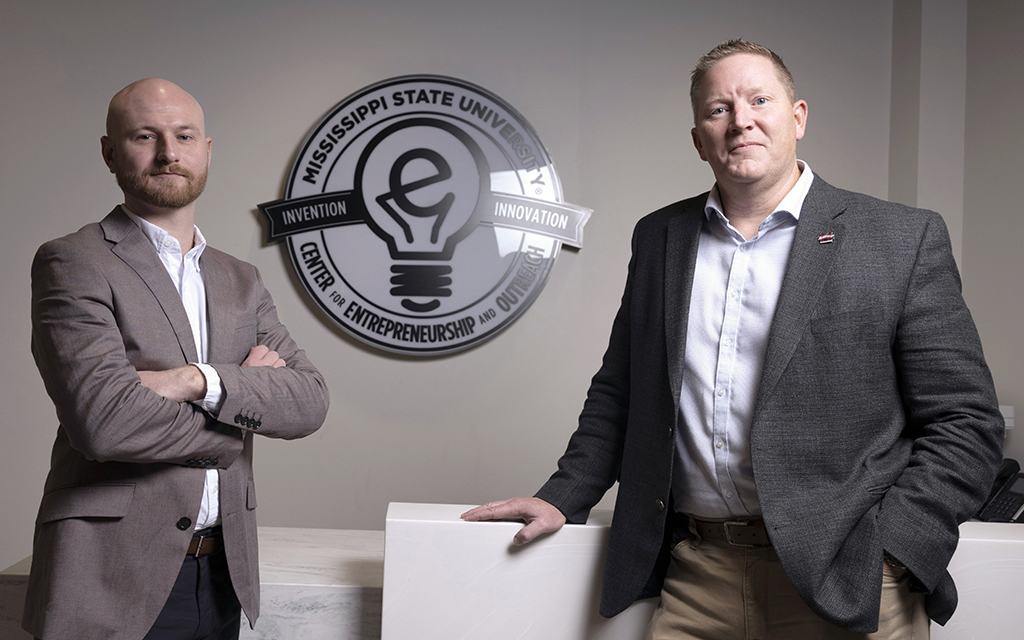Mississippi State really means business when it comes to supporting emerging entrepreneurs.
In 15 years, the university’s Center for Entrepreneurship and Outreach has grown from a two-person office suite in the College of Business to a 4,000-square-foot space serving as the confluence of new ideas, academic theory and business support and mentorship.
In April 2024, MSU celebrated the completed renovations of the unit, also known as the E-Center, after an expansion project doubled the size of its McCool Hall footprint. The new space now offers faculty-in-residence offices, space for emerging entrepreneurs to develop their ideas, and on-demand space for instructors of innovation-related courses to meet with students.
“The expanded E-Center provides additional learning space for students needing to meet with mentors and a spot to showcase our success stories to provide students with that extra drive when challenges start to mount,” said Scott Grawe, College of Business dean.
The recent boom in entrepreneurship isn’t isolated to MSU’s campus. Locally, university administrators recognized the need for more support after the COVID-19 pandemic redefined business in America. Since 2020, applications for new businesses and startups have surged nationally each year, research by the University of Maryland and the Federal Reserve shows, outpacing their prepandemic levels.
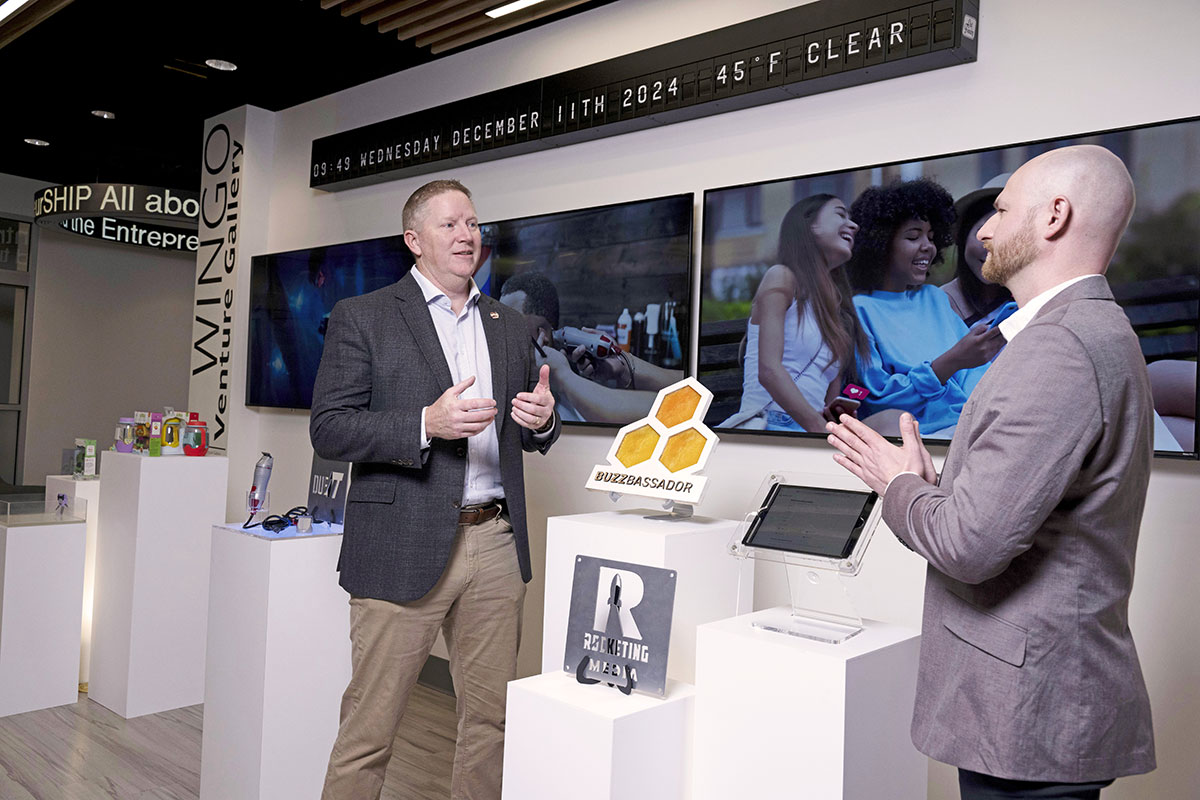
To foster this entrepreneurial spirit at MSU, university administrators are focused on making the E-Center open and accessible to all students, no matter which college they’re enrolled in. Leading the center and its charge is Nick Pashos, who joined the university this fall and can draw from personal experience as a student-entrepreneur to inform his leadership. He founded BioAesthetics Corp., a company that develops grafts for patients undergoing soft tissue reconstruction surgeries, while working on a doctoral degree at Tulane University in 2015.
Like many students the E-Center serves, the bioengineer-turned-entrepreneur said he was more versed in the technical side of his products than the business angles needed to turn them into a profitable venture. It was support from his faculty mentors, he said, that led to a connection with the venture capital-backed accelerator program IndieBio, which in turn sparked the growth of his business—an act he hopes to replicate for aspiring Bulldogs.
“I was an engineer, so I mainly took classes in engineering. Outside of a business class here or there, I had no idea what it took to start a business when I was still a student,” Pashos said. “I came back to academia to help students who are in the same position I was in. Seeing someone exactly where you were years ago and helping them through those steps and hurdles—it’s a really exciting opportunity.
“Mississippi State has everything you could ask for from educational, research and business perspectives,” he continued. “In five years, I’d love to see entrepreneurship really integrated into a lot of the areas that traditionally are isolated from the business world.”
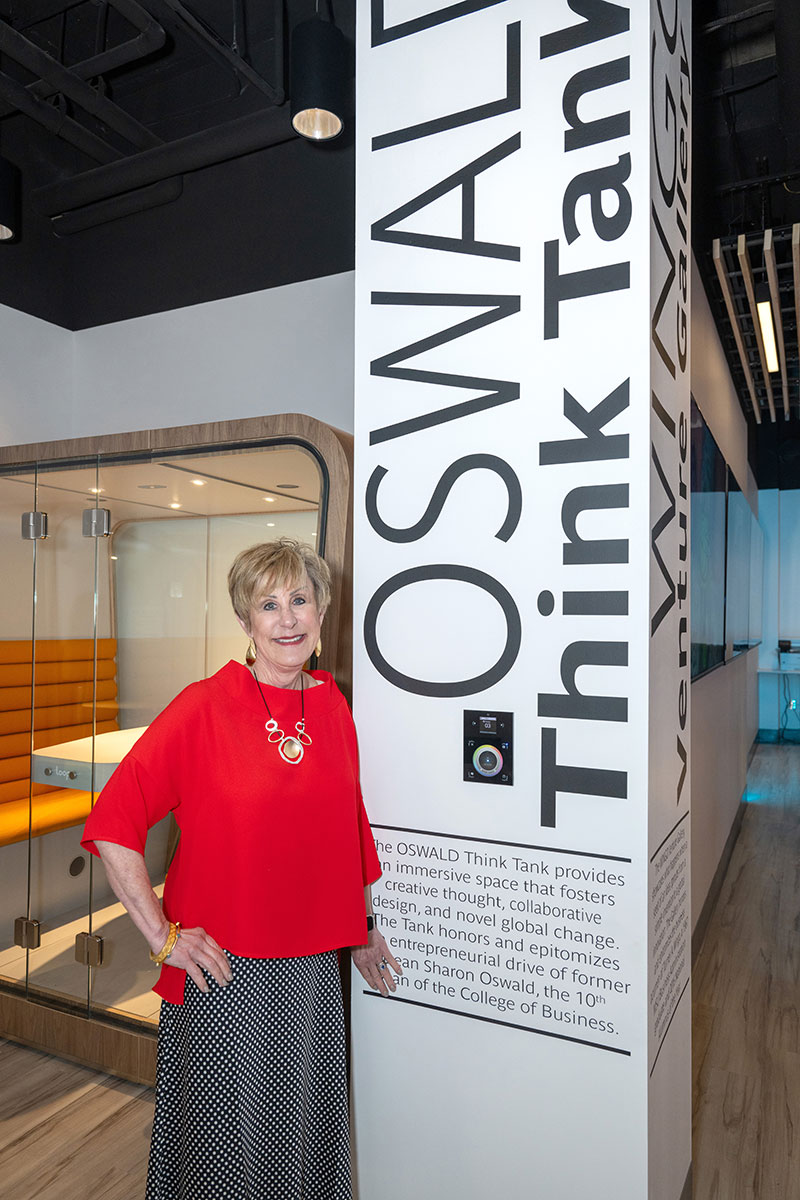
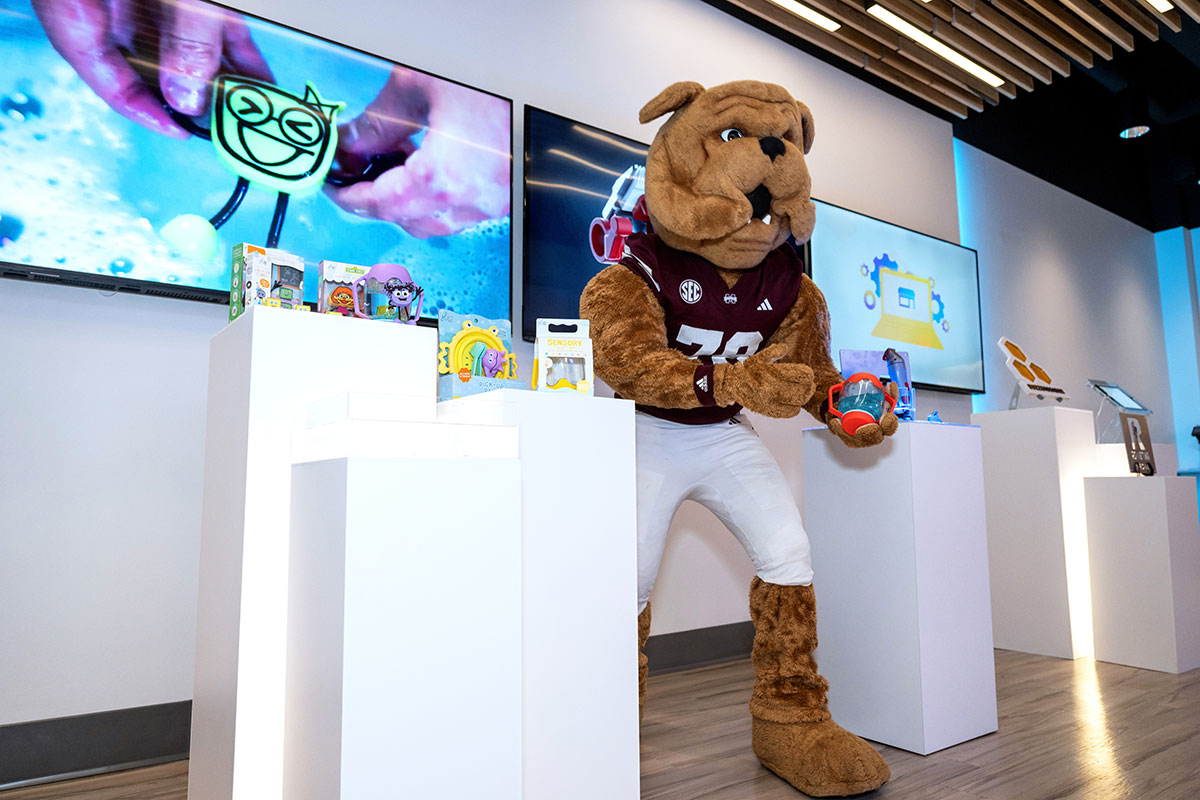

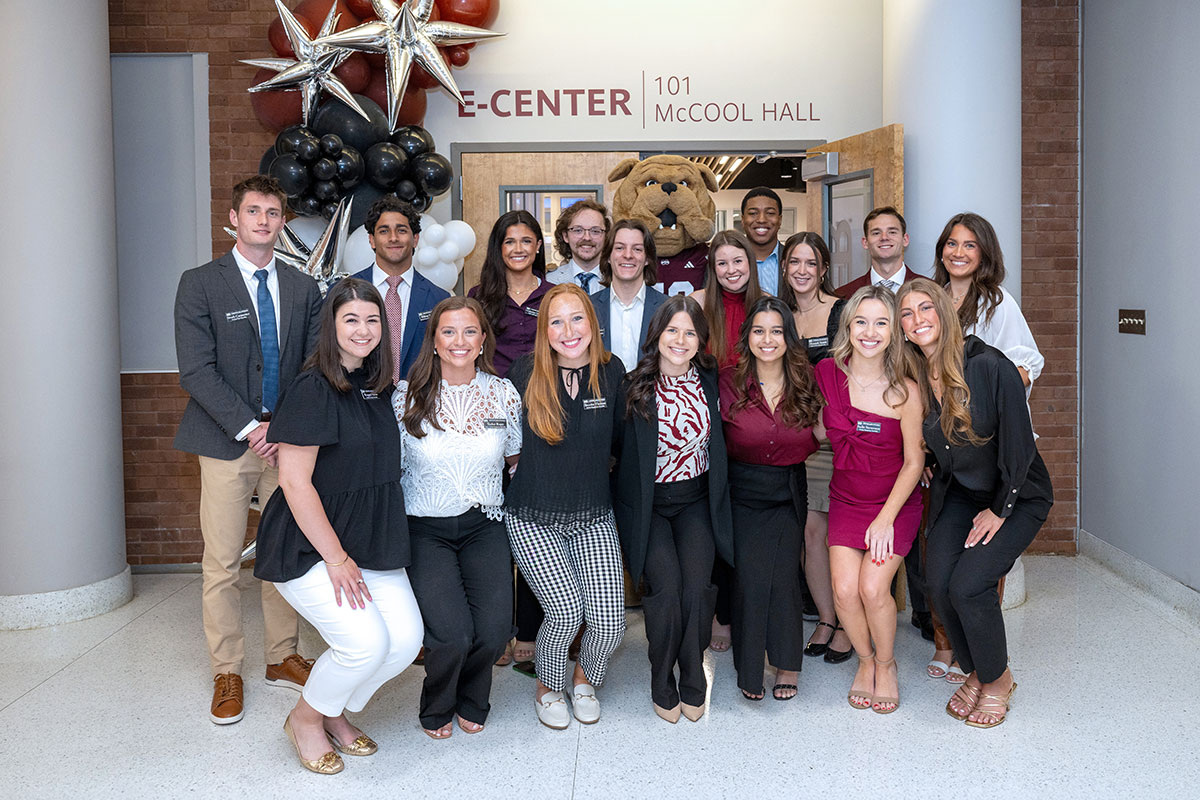
During the grand opening of the renovated space, Bully helped showcase some of the center’s new features including: small-group meeting spaces; the Oswald Think Tank, named for retired business dean Sharon Oswald; and a display featuring some million-dollar ideas brought to life by E-Center alumni.
In addition to its on-campus home, the center boasts off-campus locations including the 2,000-square-foot Idea Shop, a collaboration between the College of Business and School of Human Sciences that houses the Turner A. Wingo Maker Studio and MSU Retail Product Accelerator in downtown Starkville; coworking space in Starkville’s Innovation Hub; and a satellite office in Vicksburg—all spaces to make ideas come to life.
Another key resource it offers is cold, hard cash to take an idea from concept to production or application.
Through the MSU VentureCatalyst program, students, faculty or staff can receive up to $7,500 through three rounds of grant funding to assist with developing a proof of concept, customer and market discovery, and execution of an approved business plan. The E-Center manages other startup funding sources, including up to $1,500 through the Boost Fund, helping organizations overcome specific needs holding back growth or development; up to $5,000 from the National Science Foundation’s I-Corps Site training program focusing on science- and technology-related research ideas; and up to $10,000 through the MSU Sidecar Fund, which provides funding to help magnify the interest of outside private investors.
In all, the E-Center distributes more than $100,000 annually in equity-free startup grants, competition prizes and other student supports. Helping match people and ideas to grant funding is Garrison Walker, who oversees the E-Center’s VentureCatalyst program.
Walker uses his past experiences with the E-Center to connect with students. In 2019, he and a few fellow Starkville Academy students created 3D-printed silencers for cowbells. The group’s idea swept through the competition at the E-Center’s 2020 high school innovation challenge, then Walker and the other founders received $2,500 to develop the business through the VentureCatalyst program after he enrolled at the university in 2020. The silencer, now known as the Hush! Puppy, was reintroduced to local and area markets this year after Walker rebooted the business following turnover in the founding group.
“There’s a lot of self-fulfillment working with these students because that was me four years ago. I’m fortunate to be in this position to help people do the same thing,” he said. “It’s exciting to see them get funded or hear them when they deliver a killer pitch. We’re here to support and coach them. When it all comes together and works for them, there’s no better feeling.”
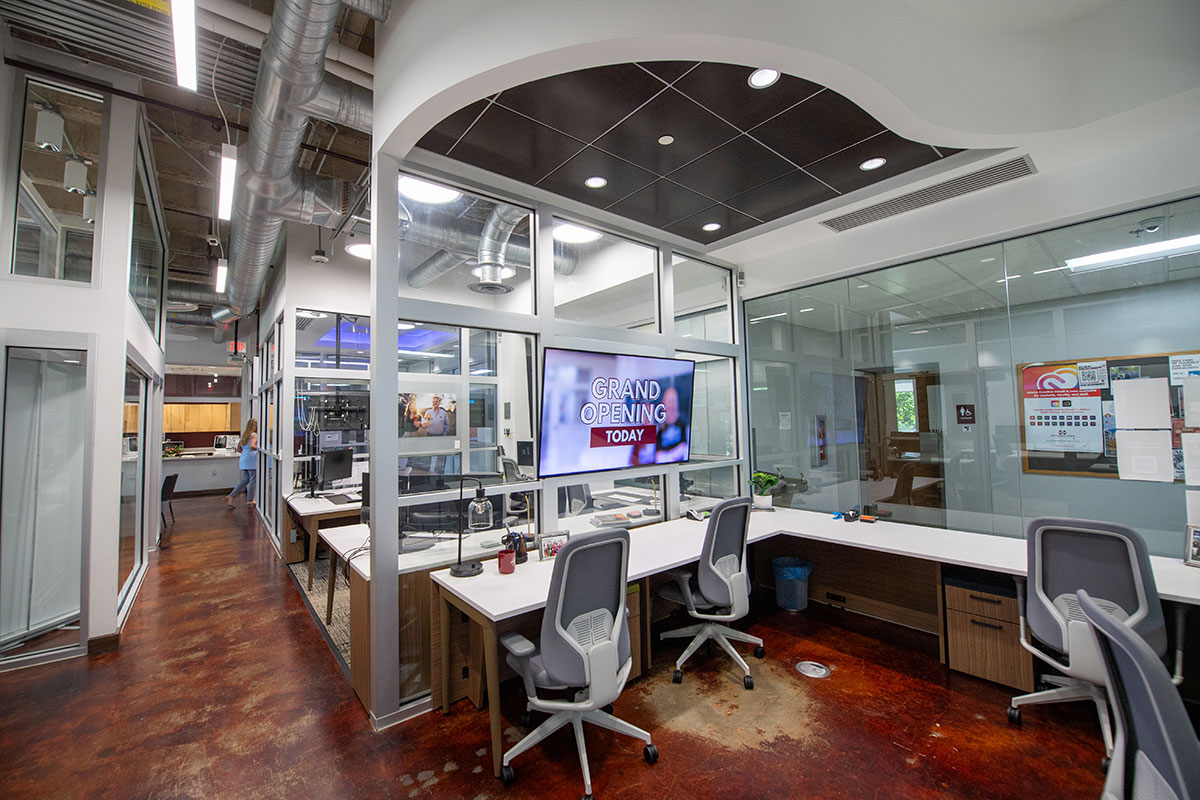

Without this kind of personal support and guidance, one of the world’s fastest-growing companies wouldn’t exist. In 2015, MSU undergraduates Anna Barker, Kaylie Mitchell and Hagan Walker had an idea for light-up, ice cube-shaped devices for drinks. Thanks to the E-Center’s support, the students founded what is now known as the Glo Companies, with products that include bath-time sensory toys designed with children who have autism or other special needs in mind.
Since expanding its product line and partnering with Sesame Workshop to bring its beloved characters to life, Glo Companies has become a major player in a niche market. It landed at No. 282 on the Financial Times’ 2024 list of fastest-growing companies, which encompasses 500 organizations throughout 35 countries in North, Central and South America.
“There is no Glo without the Mississippi State E-Center. It just wouldn’t exist because the idea wouldn’t have been tried without its help,” said Barker, who was named to Inc. Magazine’s 2024 Female Founders 250 list of the most influential women in business. “I was on a very specific path throughout much of my college experience. I had no idea I would become interested in engineering or product design until I bumped into the perfect arrangement of professors and staff thanks to the E-Center.
“Our experience is unique, but the E-Center’s support isn’t. The staff and mentors truly want everybody to succeed, and we felt supported and encouraged the whole time, especially on some of the harder days,” she explained. “Without the E-Center, Glo would have never been on our radar. We would have continued on the traditional paths that were laid out for us and then gone on a traditional career track. We needed their specific resources at that very critical moment in time for us and our idea, and that support changed our lives.”
By Carl Smith, Photos by Jonah Holland & Beth Wynn

Bulldog Business
Whether through time, money or other resources, alumni support can go a long way to helping student startups. Mississippi State University offers many avenues for the Bulldog family to help budding businesses and the university’s Center for Entrepreneurship and Outreach.
Mentorship
• One-on-one mentorship: Each student team in the E-Center’s VentureCatalyst program is paired with a mentor based on skills, background and interest. One-on-one mentors work deeply with their assigned teams.
• Office hours: Rather than working closely with a few teams, some mentors prefer to serve as light advisors to many groups by holding office hours or making themselves available in person or through video chat a few hours per month.
Evaluate pitches and review teams
• E-Center Advisory Board membership: The ECAB hears three to five pitches each month and makes award decisions from the Startup Grant Fund.
• Investment Review Council membership: The IRC ensures startup companies are adequately prepared to raise money. Each quarter, the council reviews their plans, projections and preparedness.
Invest in student and faculty companies
• Bulldog Angel Network: The BAN is a private group that invests about $1 million each year in early stage companies that are majority owned by MSU students, faculty or alumni.
• North Mississippi Angel Fund: The NMAF is a privately managed investment fund that also contributes to early stage companies.
Make a gift
• The E-Center distributes more than $100,000 each year in equity-free startup grants, competition prizes, student internships, and other student support funded by a small endowment and private contributions. To learn more about giving opportunities, contact Rob Jenkins, Senior Director of Development for the College of Business, at 662.312.9300 or [email protected].
For more information on how to support the MSU E-Center, email [email protected].


